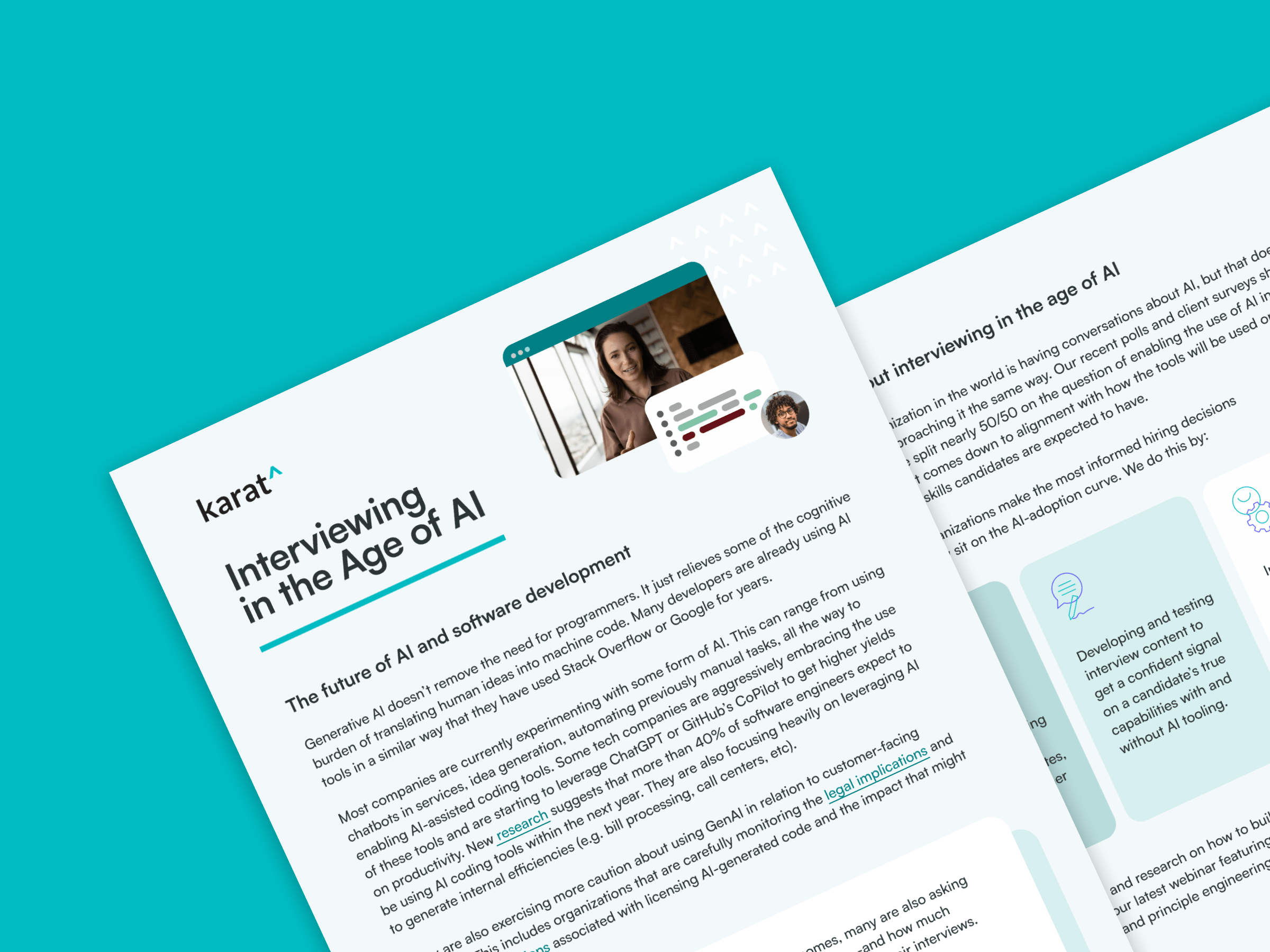Interviewing Tips
08.02.2024
3 Ways to Make Your Interview Process More Effective

The Karat Team


Interviews are incredibly important for hiring the most qualified candidate, as they’re the main method of evaluating candidates and narrowing down your pool of applicants to just one person. Good interviews are predictive, fair, and enjoyable, and achieving this requires carefully and scientifically designing your interview process.
There are many ways to improve your interview process, especially when you break it down into individual components and scrutinize each of them. It can be overwhelming to figure out where to start, so we’ve highlighted three areas below that can make a big difference in improving your interview process.
Create Consistency
One of the biggest keys to effective interviews is consistency throughout the entire interview process. This includes the interview questions, how candidates are evaluated, and the candidate experience.
Using a standard list of interview questions for every candidate creates an equitable, transparent, and enjoyable candidate experience. It puts all candidates on a level playing field where they’ll be assessed on the same criteria.
Scoring rubrics help ensure that candidates are evaluated consistently by establishing the core competencies that candidates are evaluated on and a rating system that all interviewers use. They also provide everyone on the hiring team with a shared language when discussing candidates and remove subjectivity. Scoring rubrics make it easier to assess candidates and minimize bias, ultimately generating a stronger, more accurate hiring signal.
Lastly, it’s important to have trained interviewers who can not only stick to the interview process that you’ve created, but also provide a great interview experience to candidates. Good interviewers put candidates at ease, ask questions clearly and with empathy, and help candidates bring out their best performance. By training interviewers to offer a consistent experience, you can create a more predictive interview process where candidate performance doesn’t vary based on how “hard” or “easy” an interviewer is.
Offer Second Chances
Interviews can create a lot of anxiety for candidates, especially for those who have less experience with them. Even with a lot of practice and preparation, candidates may not do the best they can. Technology can fail, or nerves get in the way. For these reasons, companies should consider offering redo interviews, which give candidates a chance to retake an interview if they feel they didn’t do their best.
Redo interviews have several benefits for both companies and candidates. They decrease false negatives and improve hiring yield because more candidates advance without requiring additional sourcing. Across nearly 1,000 candidates who have taken redo interviews, our clients have seen a hiring yield increase of 17%.
Redo interviews also help companies reach their diversity, equity, and inclusion goals. Underrepresented minorities (URM) and female candidates, in particular, benefit from redo interviews because they typically do not have as many interview opportunities as other candidates. URM candidates are more likely to take redo interviews than any other demographic group, and our data shows that redo interviews make a difference for them. Almost 60% of Black candidates improve their score, and close rates for female candidates increase by 41%.
Measure and Iterate
Making your interview process more effective starts with figuring out the areas that can be improved and then figuring out metrics that will help you measure your progress. While the metrics that you track should correspond with your goals, here are some common metrics used.
- Passthrough ratios: Each stage of your interview process should pass through the right amount of candidates. An interview where 80% of candidates pass probably isn’t useful since it doesn’t narrow down your pipeline by much. However, an interview that passes only 20% of candidates is probably too selective, causing you to miss out on qualified candidates. Looking at passthrough rates can also reveal unconscious bias if you find that candidates from different backgrounds who score similarly aren’t advancing at the same rate.
- Candidate sentiment: How candidates feel about your interview process can tell you a lot. You can ask candidates whether the questions asked were clear and easy to understand, whether they understood how they were being scored, if the interview questions were clearly related to the role they applied for, or whether the questions were aligned with the job level. Gathering feedback on these aspects can show you how effective your interview questions, scoring, and interviewers are.
- Interview-to-offer ratio: The interview-to-offer or onsite-to-offer ratio measures the number of interviews or onsite interviews conducted compared to the number of offers made for a role. This metric indicates the accuracy and efficiency of your interview process. There isn’t a “perfect” interview-to-offer ratio because it depends on your market, location, and role requirements. However, a ratio over 15:1 is usually unnecessarily high and can indicate that your interview process is too selective, there’s a mismatch between candidates and your job description, or there are inefficiencies in your process.
Tracking the metrics you’ve decided on is just half of the equation though. With this data, you now have a reference point so you can see if the changes you make have a positive or negative impact. Keep on iterating on your interview process and using these metrics to hold yourself accountable to your goals.
Aside from these three tips for increasing the effectiveness of your interview process, there are many other things you can do to make interviews more predictive, fair, and enjoyable. Get additional guidance and dive deeper into designing scoring rubrics and interview questions by downloading The Engineering Leader’s Guide to Technical Interviewing.
Related content

eBooks
08.02.2024
Download the ebook to learn how you can transform your organization’s technical hiring.

Webinars
08.02.2024
Our panel of experts delved into the myriad ways AI is changing the face of engineering interviewing and hiring for the better. Join our Part 2 of this webinar series happening Wednesday, September 13th, learn more here. Learn from seasoned experts on the topic, Jason Wodicka, Principal Engineering Advocate, and Don Gannon-Jones, VP of Content, at […]

Webinars
08.02.2024
Wednesday, October 25th @ 10am PT | 1pm ET The engineers of tomorrow will have access to powerful, potentially disruptive AI-based tools. Join our upcoming webinar to learn how to build engineering interviews that assess your engineering candidates’ true ability, regardless of whether they’re leveraging AI tools on the job. Can’t make it? No problem […]